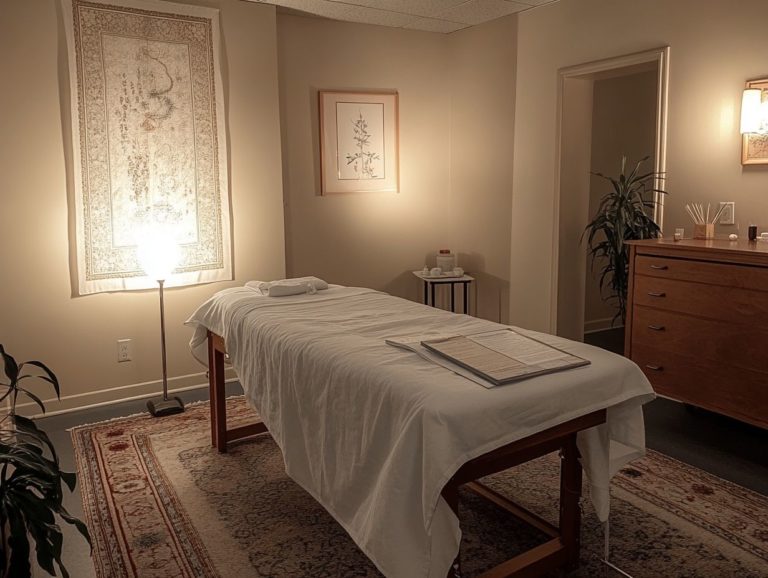Understanding Alternative Medicine: Key FAQs
Alternative medicine presents a variety of healing practices that extend well beyond conventional treatments, capturing the attention of those who seek holistic approaches to their health.
This article explores the many types of alternative medicine, examining their distinct modalities along with the advantages and disadvantages of using them.
It also addresses common questions about their safety and effectiveness while offering practical tips on how to seamlessly incorporate these practices into your current health routine.
Join us on this exciting journey as you uncover the potential benefits and important considerations surrounding alternative medicine.
Contents
Key Takeaways:

Alternative medicine includes practices like herbal remedies, acupuncture, and yoga that aim to promote holistic well-being. While these methods can offer potential benefits, there are also limitations and risks that should be carefully considered. Integrating alternative medicine into your health routine can be beneficial, but always consult with a healthcare professional and do thorough research before trying any new treatments.
Defining Alternative Medicine
Alternative medicine offers a diverse array of practices that go beyond conventional medical treatments. It emphasizes holistic approaches that consider not only physical ailments but also mental and emotional well-being.
You’ll find methods like traditional Indian healing systems, acupuncture, and herbal therapies, all designed to promote wellness. By embracing the mind-body connection, alternative medicine aims to elevate your quality of life and encourage preventive care.
These modalities highlight the importance of viewing you as a whole person, acknowledging that health issues may arise from various life stressors and lifestyle choices.
Unlike traditional medicine, which often focuses on symptoms through pharmaceuticals and surgical interventions, alternative practices provide a refreshing perspective by utilizing natural remedies and supportive therapies.
Healthcare professionals specializing in alternative medicine are essential in guiding you toward informed wellness choices. They skillfully blend scientific insight with a deep respect for your body’s innate healing abilities. This collaborative relationship invites you to explore diverse options and facilitates your personal journey toward optimal health.
Types of Alternative Medicine
Explore a variety of alternative medicine practices that promote holistic health and well-being. These approaches emphasize treating the whole person rather than merely addressing specific symptoms.
- Consider Ayurvedic medicine, which aims to harmonize the energies within your body.
- Then there s acupuncture, renowned for its effectiveness in alleviating pain and reducing stress.
- Chiropractic care offers alignment to your body s systems and helps relieve discomfort, while massage therapy serves as a pathway to relaxation and emotional balance.
Overview of Different Modalities
An exploration of the various modalities of alternative medicine unveils a wide range of practices aimed at supporting the connection between your mind and body in diverse ways. You’ll encounter the ancient wisdom of Ayurvedic medicine, the precise needle therapy of acupuncture, and the restorative spinal adjustments offered by chiropractic care.
These approaches not only provide you with unique perspectives but also cater to a wide array of health concerns. For example, Ayurvedic medicine emphasizes achieving balance through personalized diets and herbal remedies, striving to harmonize your body s energies.
In contrast, acupuncture targets specific pressure points to alleviate pain and enhance overall wellness, drawing from its deep roots in traditional Chinese philosophy. Meanwhile, chiropractic care focuses on spinal health to relieve musculoskeletal issues and boost neurological function.
Each modality plays a distinct role in patient care, addressing physical ailments while also acknowledging and treating psychological stresses, ultimately fostering holistic healing.
Benefits and Limitations of Alternative Medicine

The benefits and limitations of alternative medicine are crucial factors to consider. They can greatly impact your outcomes and overall well-being.
On one hand, alternative therapies often promote emotional balance and self-healing through tailored approaches, empowering you to take charge of your health. On the other hand, there are limitations to acknowledge, such as possible lack of scientific proof and the necessity for comprehensive health history assessments.
Balancing these aspects can lead to a more informed and effective path in your healing journey.
Pros and Cons of Using Alternative Medicine
When exploring alternative medicine, you must carefully weigh the pros and cons. These factors can significantly impact its effectiveness and safety.
The benefits often include a method that considers the whole person body, mind, and spirit promoting improved overall wellness and personalized care. However, you should also consider the drawbacks, such as the limited research supporting certain practices and the potential interactions between alternative therapies and conventional medications.
Alternative medicine frequently emphasizes empowerment as a patient, enabling you to take a more active role in managing your health. This can cultivate a sense of independence and control over your wellness journey. On the flip side, the lack of robust scientific evidence for many alternative practices raises valid concerns about their reliability and efficacy.
This balancing act requires thoughtful consideration. Navigate the complexities of integrating alternative approaches with traditional healthcare to ensure that your choices are both safe and beneficial.
Commonly Asked Questions about Alternative Medicine
When exploring alternative medicine, you may find that commonly asked questions revolve around safety, effectiveness, and availability. To better understand these aspects, you can refer to common myths about alternative medicine. It’s natural to seek clarity on how these practices can harmonize with your overall health strategy.
You might often wonder about the qualifications of health practitioners, the scientific evidence supporting various therapies, and how to seamlessly integrate these alternatives with traditional medical care to achieve optimal wellness outcomes.
Answers to FAQs about Safety, Effectiveness, and Availability
Addressing FAQs about safety, effectiveness, and availability in alternative medicine is essential for your well-considered choices. Safety should always be your top priority; ensure that the practitioners you choose are qualified and that the treatments align with your specific health needs.
Research shows that some alternative therapies can complement conventional medicine effectively, although not all modalities are equally supported by robust scientific evidence. Consulting reputable studies is crucial. This helps you understand the potential benefits and risks of various treatments.
Finding reliable practitioners requires diligence look for certifications, read patient reviews, and assess their professional background. By taking these steps, you empower yourself to make informed choices that prioritize your well-being while exploring the alternatives available to you.
How to Incorporate Alternative Medicine into Your Health Routine

Incorporating alternative medicine can transform your health journey. It s an exciting step toward holistic wellness, integrating both lifestyle changes and complementary therapies.
By grasping the principles of alternative medicine and working collaboratively with healthcare professionals, you can cultivate a personalized wellness environment that promotes self-renewal and elevates your overall health.
Tips for Integrating Alternative Medicine with Traditional Medicine
Integrating alternative medicine with traditional medicine calls for thoughtful consideration and collaboration with qualified health practitioners to ensure seamless patient care and optimal health outcomes. It s crucial to have open discussions about all treatments you re undertaking, enabling a comprehensive approach that honors both conventional and holistic practices.
By engaging in dialogue with your healthcare providers, you can gain a clearer understanding of any potential interactions and risks of mixing treatments between alternative therapies and prescribed medications. Establishing a well-defined health strategy that incorporates various methods not only enhances your overall wellness but also gives you the power to take an active role in your health journey.
You should document all treatments, including dosage and frequency. Regularly reviewing your progress with healthcare professionals fosters trust and encourages a balanced perspective, ultimately leading to improved health outcomes and greater satisfaction with the care you receive.
Frequently Asked Questions
What is alternative medicine?
Alternative medicine refers to any type of healthcare practice or treatment that falls outside of conventional Western medicine. It includes a wide range of practices, such as acupuncture, herbal remedies, chiropractic care, and more.
What are some common types of alternative medicine?

Some popular types of alternative medicine include acupuncture, Ayurveda, homeopathy, naturopathy, and traditional Chinese medicine. These practices often focus on a holistic approach to healing and emphasize the body’s ability to heal itself.
How does alternative medicine differ from conventional medicine?
Alternative medicine differs from conventional medicine in its approach to treatment. While conventional medicine typically relies on medications and surgeries to treat specific symptoms or diseases, alternative medicine focuses on addressing the root cause of the issue and promoting overall wellness.
Is alternative medicine safe?
Don t wait! Consult a qualified practitioner before starting any alternative treatment. Just like any form of healthcare, there are potential risks associated with alternative medicine. It is essential to do thorough research and inform your primary healthcare provider of any alternative treatments you are undergoing.
Can alternative medicine be used alongside conventional medicine?
Yes, alternative medicine can be used alongside conventional medicine. In fact, many people use a combination of both to achieve optimal health and wellness. It is important to inform all healthcare providers of any alternative treatments being used to ensure safe and effective care.
Is alternative medicine covered by insurance?
Insurance coverage for alternative medicine varies depending on the type of treatment and your specific insurance plan. Some insurance plans may cover certain alternative treatments, while others may not. It is important to check with your insurance provider to see what is covered.
Engage with your healthcare providers today to explore how alternative medicine can complement your health journey!






